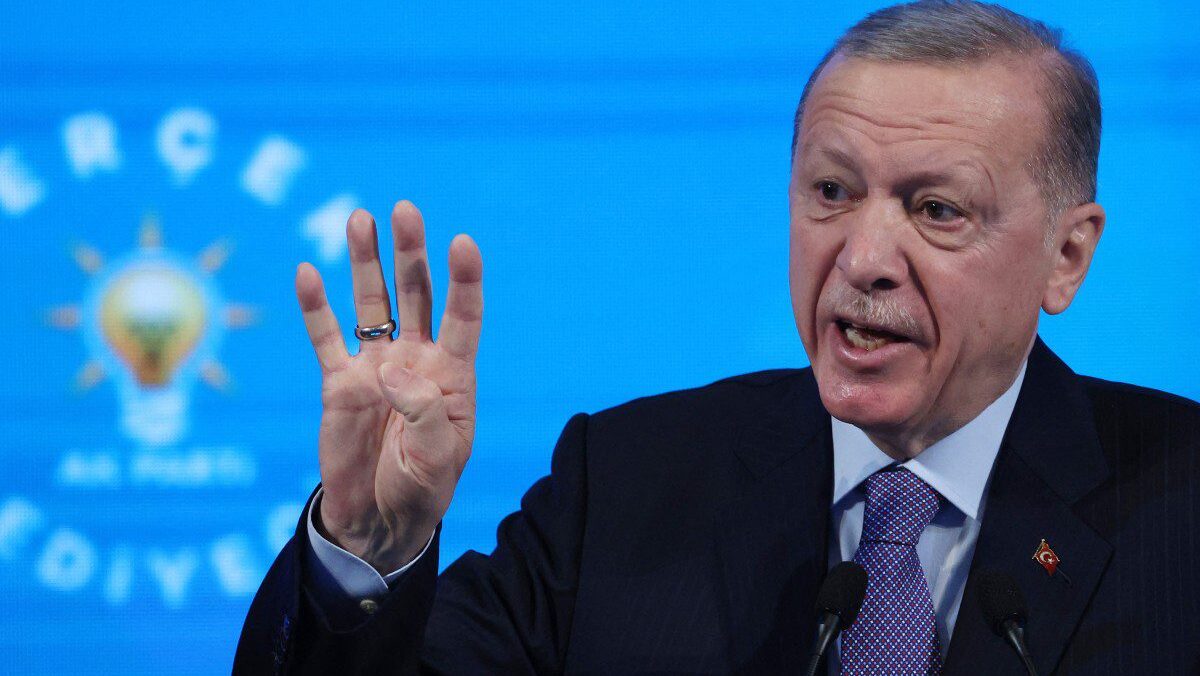
Turkish President Recep Tayyip Erdoğan speaks during the presentation of the Justice and Development Party’s (AKP) election manifesto in Ankara, Turkey, on January 30th, 2024.
Photo: ADEM ALTAN / AFP
Eager to establish a presence in the European Parliament, Turkish President Recep Tayyip Erdoğan (AKP) has founded a German offshoot of his own party, set to run in the June 9th European elections.
The German AKP affiliate, the Democratic Alliance for Diversity and Awakening (Dava), comprises four male candidates who have all previously supported Erdoğan’s AKP, Bild reports, including one who has a record of “supporting Hamas and its affiliated organizations.”
As Germany’s 5% electoral threshold does not apply to the EU election, fledgling parties have a greater chance of securing a spot in the European Parliament.
German MP Christoph de Vries (CDU) warned Bild about the newcomer:
With the founding of the Turkish Islamist party “Dava”, President Erdoğan now has, in addition to Ditib [the Turkish-Islamic Union for Religious Affairs, one of the largest Islamic organizations in Germany whose imams, officially classified as civil servants of the Turkish state, are trained in Ankara and then sent to Germany] another tool to exert political influence in Germany.
As previously reported by The European Conservative, Ankara’s strong involvement with Islamic religious institutions in other countries, and the resulting security concerns, is not a uniquely German phenomenon.
Dava already has its angle to entice voters with the demand that “people with foreign roots must be granted their rights in full.” In addition, it claims to want to combat child- and old-age poverty through social benefits while calling for a “pragmatic” and “ideology-free” refugee policy.
According to de Vries, the strategy is patently obvious: to portray Muslims as “victims of a racist majority society and to portray itself as their representatives.”
The federal government should “under no circumstance take this party’s formation lightly,” advises de Vries. “I believe it is urgent that our security authorities closely monitor all activities of this party and its connections to the Turkish government and intervene if the Turkish government exerts direct influence.”
Other high-ranking German politicians also denounced Erdoğan’s latest move, which would fragment Germany’s political landscape even further during a time of marked polarization.
“An Erdoğan offshoot running for elections here is the last thing we need,” Green agriculture minister Cem Özdemir, who has a Turkish migration background, wrote on X.
Wo wir uns einig sind: Ein Erdoğan-Ableger, der hier zu Wahlen antritt, ist das Letzte, was wir brauchen. Was mich jedoch wundert, dass gerade auch christdemokratische Regierungen DITIB & Co. immer wieder hofiert haben. Ich hoffe mit dieser Naivität ist jetzt endlich mal Schluss. https://t.co/4UPCuXeAZT
— Cem Özdemir (@cem_oezdemir) January 28, 2024
The center-right CDU, the largest opposition party, also criticized the move. “An Erdoğan-AKP offshoot in Germany would be another extremist party in the country”—a veiled reference to the popular rightist AfD, which establishment parties are keen to get rid of— Deputy Leader Jens Spahn of the CDU/CSU parliamentary group said on X.
Slamming Chancellor Olaf Scholz’s traffic light coalition government for its “ideological ignorance,” Spahn noted that with them at the helm, dual citizenship for Turks living in Germany would be the norm. This is problematic given that, as observed in Belgium in last year’s Turkish presidential elections, Turkish expats in large numbers tend to vote for Erdoğan’s party, pointing to a failure, or an unwillingness, to integrate.
Ein Erdogan-AKP-Ableger in 🇩🇪, das wäre eine weitere extreme Partei im Land. Die ideologische Ignoranz der Ampel macht es ihm leider leicht: die doppelte Staatsbürgerschaft für in 🇩🇪lebende Türken wird faktisch die Regel. Auch die Auslandsfinanzierung von Moscheen müsste endlich… pic.twitter.com/mmYopkIi5e
— Jens Spahn (@jensspahn) January 28, 2024
Erdoğan’s playing on Turkish identity, and urging resistance to embracing a European one with its associated values and beliefs, is not a new phenomenon.
During a 2008 rally in the German city of Cologne, he told 20,000 Turks living in Germany, Belgium, France, and the Netherlands:
I understand very well that you are against assimilation. One cannot expect you to assimilate. Assimilation is a crime against humanity.
He then went on to urge them to get involved in politics so that the five million Turks then living in Europe would be able to wield a “constitutional element” and not just be “guests.”
Thus far, it is not yet known to what extent the party’s message will resonate with the 1.3 million German citizens, around 1.6% of the German population, who have a Turkish migration background and make up the largest Turkish diaspora in the world.
If history is anything to go by however—almost 63% of Turks living in Germany voted for Erdoğan’s constitutional referendum in 2017, and 67% voted for him in last year’s presidential elections—the appeal of Erdoğan’s brainchild is likely to be considerable.
